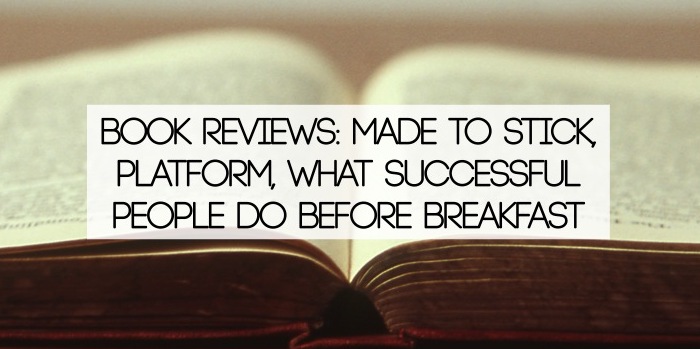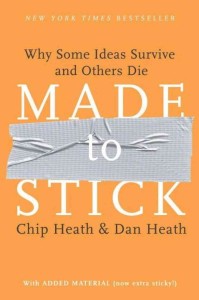I have not updated my book review section recently, so I thought I would provide everyone with a few books that I completed within the last few weeks. You can also find these reviews and the rating I have for these books (and the others book I have completed in 2014), by clicking HERE.
Platform written by Michael Hyatt
Platform is a great read from experienced, seasoned blogger, writer, and leadership guru Michael Hyatt. I have learned so much from Michael since I discovered his blog several months ago. I am an avid blogger and writer myself, so I naturally started soaking up a lot of his material. He introduced me to Evernote, and this particular book, Platform, has expanded my understanding of blogging and writing. I will need to make the disclaimer that this book has a specific audience, and that audience is writers and bloggers that have a desire to be noticed in a convoluted web of internet bloggers (although many of the principles in the book are adaptable to people that are not bloggers or writers).
In this book, Michael Hyatt covers important topics like the importance of having a specified writing style, going for it all and holding nothing back, building your home base for your blog, diversifying the types of posts on your blog, how to expand your reach by writing guest posts and embracing social media, and many other practical tips about starting and maintaining your blog and website. He encourages readers to invest in your website and your content by spending some money and buying your own website with your name (i.e. frankpowell.me is my website). He also encourages those serious about blogging and being a reputable writer to create an e-mail using your name (i.e. frankpowell@frankpowell.me is new default e-mail).
I found this book to be very practical and helpful for me. Although I do not necessarily agree with everything in this book, I thought the content is presented in a way that allows for any person to gather something and apply it. Most casual bloggers and writers are not going to use all of this material, but there are certainly practical tips for any person that wants to start blogging. If you have ever considered blogging or writing, but you are unsure how to get started, I recommend reading this book. It is an easy read, and the layout of the book allows the reader to skip over certain sections if they are not applicable.
Made To Stick written by Chip and Dan Heath
Made To Stick is a fascinating book that highlights the difference ideas that survive and ideas that die. Again, some books that make the New York Times Bestsellers list baffle me, but this book deserves to be there. I recommend it, especially if you find yourself speaking in front of crowds often, or if you are in the business world looking to get an edge. As a minister who speaks to crowds weekly, many of these principles resonate with me, and there are countless stories, examples, and one-liners that are going to influence the way I prepare and present messages going forward. Chip and Dan Heath believe there are six components of a sticky idea: simplicity, unexpectedness, concreteness, credibility, emotions, and stories. The authors go even further and say there are basically two steps in making ideas sticky: Step 1 is to find the core of your message (one statement that summarizes everything you are about to say), and step 2 is to translate the core using the SUCCESs (the six core components mentioned in the previous sentence) checklist.
Throughout the book, Chip and Dan Heath highlight some fascinating real life examples that correlate with each component. Southwest Airlines using simplicity to become the most profitable airline in the world. Army commanders forcing simplicity into their battle plans. A certain elementary school teacher curing her students of racial prejudice (one of my personal favorites). NBA coaches creating an experience that brought the reality of AIDS to life with their players using specific, concrete means. The story of Jared’s rise to fame using Subway, despite Subway executives’ belief that people would not take to the Jared story. Even stories about JFK and the state of Texas are included.
At the conclusion of the book, the authors use a few pages to summarize the previous 275 pages of material for the reader. I found these pages to be extremely helpful and valuable. I struggle to find negative things to say about the work Dan and Chip have done with Made To Stick. The material in this book will benefit almost anybody, and even if you are not in a position where you might use the ideas, the stories you read will fascinate you. Overall, this is one of the best books I have read this year.
What The Most Successful People Do Before Breakfast by Laura Vanderkam
This book could almost be labeled as a pamphlet. It is very short which means it can be read in one sitting very easily (an hour or less). Although I did not find this book to be overly captivating, Laura Vanderkam did highlight some useful information for people that are looking to be more productive and more successful. She brings out principles of many of the most successful leaders in the world, and, strikingly, there is a strong correlation between the most successful leaders in the world and their routine. For most of these leaders, their routines are very similar, and for all of them, their day starts early in the morning.
One thing I took from the book was Vanderkam’s section on willpower. She has some very insightful things to say about the relationship between willpower and productivity. Willpower works like a muscle. As the day progresses, our willpower gets weaker because we have used more of it. This statement might be the one thing I take from this book,
“There seems to be a general pattern that major self-control failures and other bad decisions occur late in the day…Diets are broken in the evening, not the morning. The majority of impulsive crimes are committed after 11:00 p.m. Lapses in drug use, alcohol abuse, sexual misbehavior, gambling excesses, and the like tend to come about late in the day.”
Her point: the most productive people do their best work in the morning. Nights are a bad time to be doing meaningful work. I tend to agree. Some of my most negative thoughts, most stressful moments, and greatest times of temptation have all occurred at night. Vanderkam also does an admirable job of explaining to the reader how mornings can be used holistically. She points out that most successful leaders work out in the morning, meditate in the morning, and disconnect from e-mails and other types of media. Mornings are used to re-charge for the day ahead.
If you are serious about getting up in the mornings, I would recommend starting with Early To Rise (I wrote a review for this book earlier this year…you can check it out by scrolling down to the book here). This book, however, would be a good way to follow up after reading Early To Rise.
_______________________
I love you all. To God be the glory forever. Amen!




